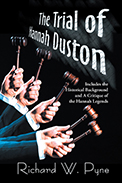
 |
For two months in 1697, Abenaki Native Americans in Haverhill, Massachusetts held Puritan Hannah Duston for ransom during King Phillip’s War. Now, brought to trial eighteen months later, Hannah stands accused of murdering nine members of the tribe—including six children—as they slept. Though Hannah concedes that she hacked nine people to death with a tomahawk, she maintains that she killed only to avoid being sold as a slave. Meanwhile, some in Haverhill believe that Hannah also killed her newborn baby who was captured with her, and then slaughtered the Native Americans to conceal that earlier crime.
Pyne uses the limited historical information available about Hannah, her abduction, and captivity, and her troubled family history as the background for her fictional murder trial. Readers’ final opinions of Hannah’s actions will be based on three questions the author poses. Was Hannah Duston a murderer or a heroically escaped mother who was desperate to return to her children? Did she, or the Abenakis, kill her baby? Should the jury consider her family’s dark past when deciding her fate?
Hannah’s confession of faith, in her own words, is included in the historical background to provide a fuller understanding of her as a person. Characters throughout the text express refreshing sympathy, unusual for the time, for the slain Native Americans. The author’s use of modern courtroom procedures in a 17th-century trial and frequent occurrences of 21st-century slang might ring false with historical fiction enthusiasts. Additional proofing for grammar and general style could smooth readability throughout. Still, Pyne clearly explains which elements of the plot are fact and which are fiction, while offering a detailed list of suggested further reading.